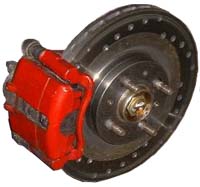If you read performance car magazines - particularly those that deal with performance
modifications to normal road cars, one of the first areas that authors emphasise is
upgrading of brakes as one of the first steps you should take. After all, this seems to
make perfect sense; if you are looking at big performance gains surely you need bigger
brakes to match that performance? Yes it does - but only if the brake upgrades are
performed and engineered properly. Why might larger brakes be beneficial?
- If you are using all that extra performance, you may discover that you are using the
brakes far more frequently - and if on track, you will be attempting to slow the car down
from higher speeds that were achievable before the modifications had been performed. This
means more heat. Larger rotors and pads have much better heat dissipation properties.
Result: less brake fade and less disc and pad wear.
- Larger rotors mean that the calipers biting on the rotors have more leverage. The upshot
of this is that maximum retardation can be more rapidly applied, and requires less pedal
effort. This is most noticeable from very high speeds where more force may be required to
slow the rotational velocity of the road wheels. This can result in shorter stopping
distances - but largely this is dependent upon how effective your old standard brakes
were!
- Uprated calipers using multi-pot designs (such as AP racing/ HiSpec/ Mike Satur/
Wilwood/ Brembo etc that all have 4 or more pots per caliper) offer improved pad
stability. The benefit of this is that the pad is less likely to rotate in the caliper
resulting in 'taper-wear' where the leading edge of the pad wears faster than the trailing
edge. High-end calipers, such as those sold by Brembo [read more here], actually use
larger pistons at the trailing edge of the pad, and smaller pistons at the leading edge in
such a way that is specifically designed to over come this phenomenon of taper-wear [Taper
wear references: RPMnet, StopTech].
All this sounds great - we should all rush out and buy bigger brakes for our car
immediately! HOWEVER, there are plenty of opportunities to get things very wrong and
actually make the brake performance rather worse than the apparently puny brakes fitted to
your car as standard. There's a lot more to brakes than might immediately catch the eye -
and this is the purpose of this page to explore some of these intricacies in more detail
and in particular reference to the MGF/TF. Plus we shall explode the biggest brake myth of
all: that bigger brakes automatically mean more stopping power!

